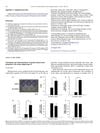Search
for
Sort by
Research
720-750 / 1000+ resultsresearch Wound Microbiota and Its Impact on Wound Healing
Wound healing is greatly affected by the types of bacteria present, which can either help or hinder the process.

research Physiological Function of Krox20 (Egr2) in Epithelial Stem Cells
Krox20 is important for maintaining stem cells in the skin and affects hair growth and color.

research Montagna Symposium 2015: Harnessing Stem Cells to Reveal Novel Skin Biology and Disease Treatments
The symposium showed that stem cells are key for understanding and treating skin diseases and for developing new skin models and therapies.

research Receptor Activator of NF-κB Stimulates the Proliferation of Epithelial Cells of the Epidermo-Pilosebaceous Unit
RANK-RANKL signaling is essential for hair growth and skin health.
research Morphogenesis and Renewal of Hair Follicles from Adult Multipotent Stem Cells
Adult mouse skin contains stem cells that can create new hair, skin, and oil glands.

research Functional Hair Follicle Regeneration by the Rearrangement of Stem Cells
Stem cells rearrangement regenerates functional hair follicles, potentially treating hair loss.

research Jagged-1+ Skin Tregs Modulate the Innate Immune Response to Wound Healing
Jagged-1 in skin Tregs is crucial for timely wound healing by recruiting specific immune cells.

research Signaling Couples Hair Follicle Stem Cell Quiescence With Reduced Histone H3 K4/K9/K27me3 for Proper Tissue Homeostasis
Certain signals are important for reducing specific chemical markers on hair follicle stem cells during rest periods, which is necessary for healthy hair growth.

research Tissue Resident Foxp3+ Regulatory T Cells: Sentinels and Saboteurs in Health and Disease
Foxp3+ Regulatory T Cells are important for immunity and tolerance, affect hair growth and wound healing, and their dysfunction can contribute to obesity-related diseases and other health issues.

research Wound Healing and Skin Regeneration
Hair growth phase and certain genes can speed up wound healing, while an inflammatory mediator can slow down new hair growth after a wound. Understanding these factors can improve tissue regeneration during wound healing.

research Signaling in the Stem Cell Niche: Regulating Cell Fate, Function, and Plasticity
The niche environment controls stem cell behavior and plasticity, which is important for tissue health and repair.

research Editorial: Hair Follicle Stem Cell Regeneration in Aging
Aging causes hair loss and graying due to stem cell decline and changes in cell behavior and communication.

research Hair Follicle Regeneration Using Grafted Rodent and Human Cells
Grafted rodent and human cells can regenerate hair follicles, but efficiency decreases with age.

research Mediator 1 Ablation Induces Enamel-to-Hair Lineage Conversion in Mice Through Enhancer Dynamics
Removing Mediator 1 from certain mouse cells causes teeth to grow hair instead of enamel.

research Coordinated Activation of Wnt in Epithelial and Melanocyte Stem Cells Initiates Pigmented Hair Regeneration
Wnt signaling is crucial for pigmented hair regeneration by controlling stem cell activation and differentiation.

research Gelatin-Chondroitin-6-Sulfate-Hyaluronic Acid Scaffold Seeded with Vascular Endothelial Growth Factor 165 Modified Hair Follicle Stem Cells as a Three-Dimensional Skin Substitute
Modified rat stem cells on a special scaffold improved blood vessel formation and wound healing in skin substitutes.

research Regeneration of Mouse Skin Melanocyte Stem Cells In Vivo and In Vitro
The research found ways to activate melanocyte stem cells for potential treatment of skin depigmentation conditions.

research The Effect of Mesenchymal Stem Cells and Chitosan Gel on Full Thickness Skin Wound Healing in Albino Rats: Histological, Immunohistochemical and Fluorescent Study
Mesenchymal stem cells, especially injected into the skin, heal wounds faster and better than chitosan gel or other treatments.

research Pre-Aggregation of Scalp Progenitor Dermal and Epidermal Stem Cells Activates the WNT Pathway and Promotes Hair Follicle Formation In Vitro and In Vivo Systems
Grouping certain skin cells together activates a growth pathway that helps create new hair follicles.
research Temporary Cell Cycle Arrest in Human Scalp Hair Follicles and Their Epithelial Stem Cells by ALRN-6924: A Novel Strategy to Selectively Protect p53-Wildtype Cells Against Paclitaxel-Induced Alopecia
ALRN-6924 may prevent hair loss caused by chemotherapy.

research The CD44+ALDH+ Population of Human Keratinocytes Is Enriched for Epidermal Stem Cells with Long-Term Repopulating Ability
Certain human skin cells marked by CD44 and ALDH are rich in stem cells capable of long-term skin renewal.

research Hair Follicle Generation by Injections of Adult Human Follicular Epithelial and Dermal Papilla Cells into Nude Mice
Injecting a mix of human skin and hair cells into mice can grow new hair.

research Enrichment and Characterization of Human Dermal Stem/Progenitor Cells Using Collagen Type IV
Scientists identified a group of human skin cells with high growth and regeneration potential.

research Sept4/ARTS Regulates Stem Cell Apoptosis and Skin Regeneration
Mice without the Sept4/ARTS gene heal wounds better due to more stem cells that don't die easily.

research Ficoll Density Gradient Sedimentation Isolation of Pelage Hair Follicle Mesenchymal Stem Cells From Adult Mouse Back Skin: A Novel Method for Hair Follicle Mesenchymal Stem Cells Isolation
A new method quickly and efficiently isolates hair follicle stem cells from adult mice, promoting hair growth.
research Elevated Ornithine Decarboxylase Activity Promotes Skin Tumorigenesis by Stimulating the Recruitment of Bulge Stem Cells but Not via Toxic Polyamine Catabolic Metabolites
Increased ODC activity leads to skin tumors by recruiting stem cells, not by toxic byproducts.

research Apoptosis in Hair and Skin: A Review
The study concludes that regulating apoptosis could lead to new treatments for various skin and hair conditions.

research Applications of Human Pluripotent Stem Cell-Derived Skin Organoids in Dermatology
Skin organoids from stem cells can help study and treat skin issues but face some challenges.

research In Vivo Reprogramming of Wound-Resident Cells Generates Skin with Hair
Scientists can now create skin with hair by reprogramming cells in wounds.